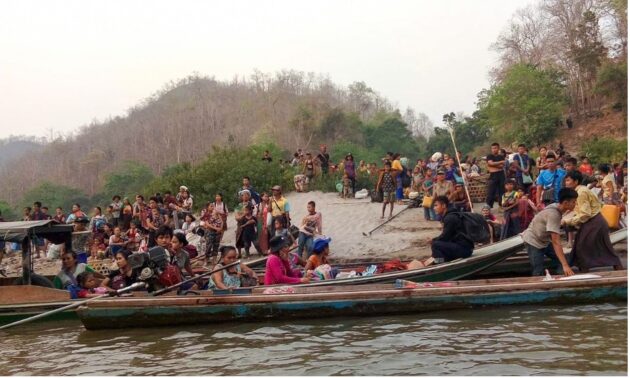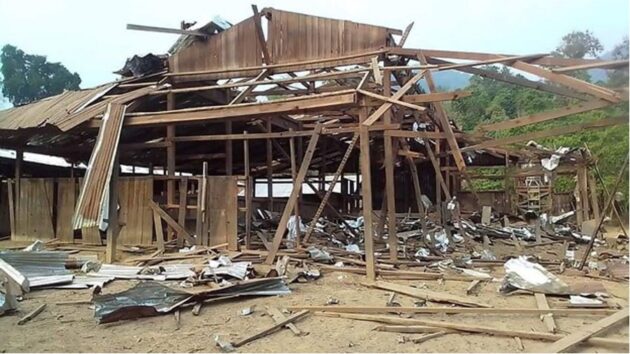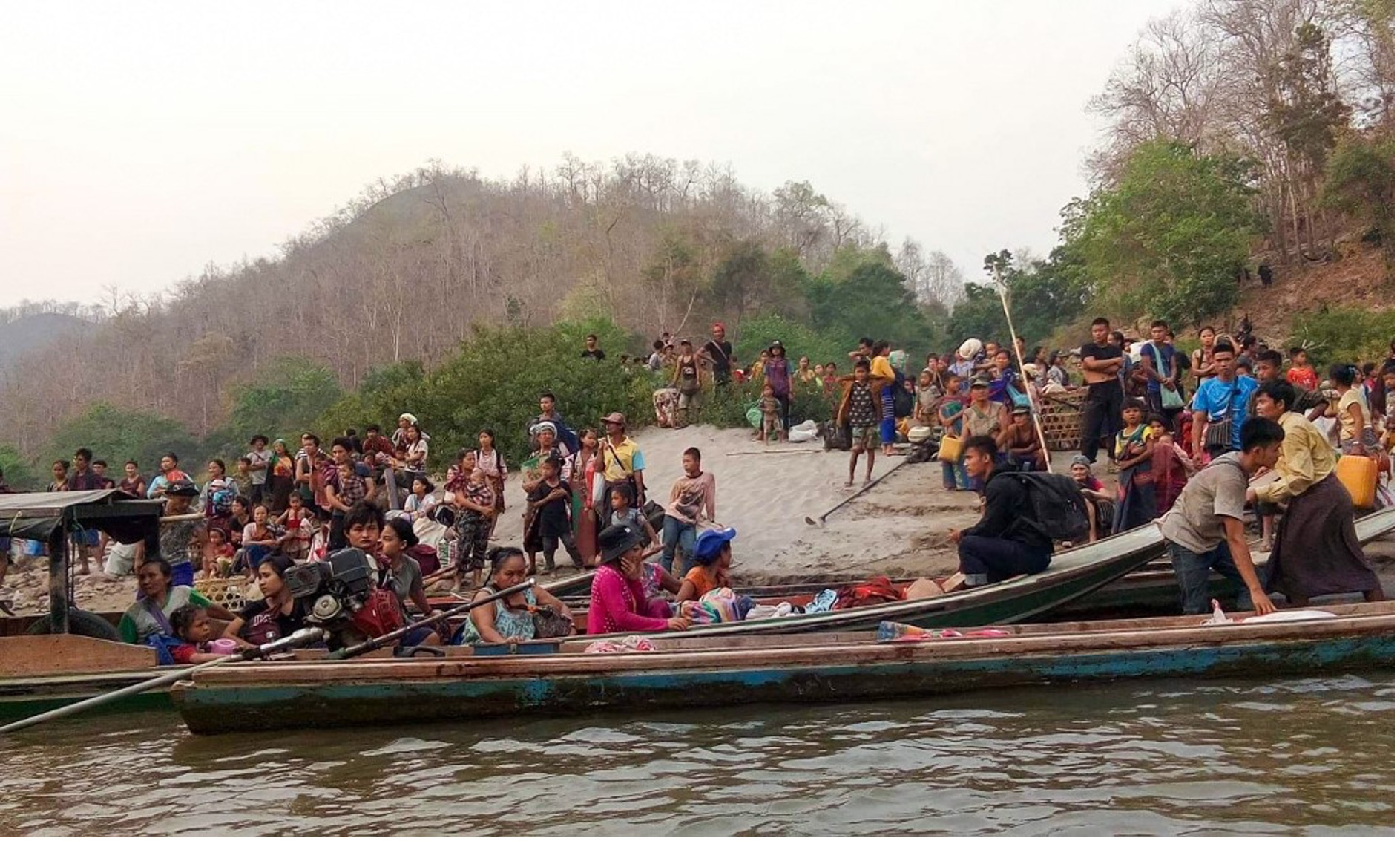25th April 2021
Stanley Baldwin, the British Prime Minister said in 1932 “The only defence is in offence, which means that you have to kill more women and children more quickly than the enemy if you want to save yourselves.” He was referring to aerial bombardment, but it is a motto which the Junta in Myanmar seems to have taken to heart. Over the weeks since the February 1st start of demonstrations, they have escalated the response so that now they are hitting the EAOs from the air, destroying villages, and intensifying the actions in the cities, deliberately targeting women, children, medical staff and random passers-by.
Myanmar air force jets strafed, bombed and shelled villages, schools and rice barns over four nights, killing 19 and displacing up to 30,000 people, according to the Karen National Union, a rebel group in the eastern state bordering Thailand. The military struck after the armed wing of the KNU over-ran one of its bases and killed 10 soldiers, on the day the ruling junta was celebrating Armed Forces Day in the capital Naypyidaw.


The bombardment that started on March 27 was brutal. Thousands of people, mainly women and children, fled the shelling on boats across the Salween river into Thailand, where authorities pushed them back. Fighting has also broken out in Kachin state, where an armed group overran police and military outposts, and the military responded with deadly air strikes.
The signs of trouble, however, are mounting. China — Myanmar’s biggest trading partner and largest arms supplier — has voiced concern over the safety of its oil and gas pipelines that cross the country, after anti-coup activists threatened to attack them in protest against Beijing’s failure to condemn the coup. The general strike called by the civil disobedience campaign has paralysed government business, crippled the banking system and stifled output in what under democratic rule was one of south-east Asia’s fastest growing economies. (8%+ increase in annual GDP).
International trade has stopped with tens of thousands of workers in logistics, transport, ports, customs clearance and government agencies heeding the strike call. Factories have closed. Long queues have formed at bank ATMs in recent weeks caused, say, businesspeople, by a shortage of cash delivered by the central bank.
Strikes by health workers, and their subsequent imprisonment by the regime, have impeded the country’s already inadequate medical system. Schools and universities remain closed. Several foreign investors have announced plans to leave Myanmar or pause their business. A few — including Japanese beer group Kirin and South Korean steelmaker Posco — were bowing to longstanding calls to end partnerships with military-controlled companies, but a more general flight of foreign capital has started. Trade unionists opposed to the coup have urged foreign clothing chains to stop purchases from Myanmar and some have done so, at the cost of about 200,000 jobs, according to one estimate. Fitch Solutions forecasts a drop in GDP of 20% this year.
The UN reports growing hunger in Yangon’s poorer neighbourhoods, rising narcotics production in Shan state and what they see as an inevitability that more people will flee or be trafficked across national borders. Myanmar’s jungle drugs laboratories — nearly all of which are in Shan state — are estimated to be one of the world’s largest sources of methamphetamine and as the conflict continues, the output will grow to fund EAOs. This will have an impact on the supply of Meth into the west. The narcotic is sold over the border in Thailand and trafficked as far afield as South Korea, Australia, and New Zealand, according to UN sources.
The UN’s World Food Programme says the disruption to trade has caused rice prices to rise by an average of 5 per cent since January and cooking oil to jump 18 per cent, hitting poor city dwellers the hardest. “We remain acutely concerned about the impact of the ongoing political crisis, particularly on the ability of the poorest sections of the population to be able to source both sufficient and nutritious food on a daily basis,” says Stephen Anderson, the agency’s Myanmar country director. He says the WFP is particularly concerned about food insecurity in 10 Yangon districts, home to about 2m people, that are either under martial law or have a high prevalence of slum housing.
The UN agency estimated that another 1.5m to 3.4m people could be at risk of food insecurity in the next three to six months because of the economic slowdown caused by the political crisis.
Following the coup, major foreign brands, including Italy’s Benetton and Swedish retailer H&M, paused new orders from Myanmar.
Moreover, around 300,000 to 400,000 construction workers have lost their jobs since the coup, according to the trade unions.
They said all major Yangon infrastructure projects had been halted, including a South Korean industrial complex, the Japan-backed Yangon-Thanlyin Bridge and an extension at the Thilawa Special Economic Zone.
The WFP’s food monitoring index shows palm oil retail prices have risen by 20 percent since the start of February around Yangon. Rice prices around Yangon and Mandalay rose by up to 4 percent, it said.
Across Myanmar, rice prices rose by an average of 3 percent on monitored markets from mid-January to mid-February, the WFP said. In Bhamo and Putao townships in Kachin State, rice prices rose by 20 to 35 percent, it said.
Further price rises are expected because of the near paralysis of the banking sector, slowdowns in remittances and widespread limits on cash availability, the WFP said.
Source the Irrawaddy 22nd April 2021.

Myanmar’s economy in 2020 was already severely impacted by the pandemic, with a quarter of the country’s population already poor and a further third vulnerable to poverty. To tackle the looming humanitarian crisis, the U.N. agency has called for an additional $106 million to build an emergency stockpile of food.
The agency warned that in coming months, the number of people it currently assists will nearly triple — from 1.3 million to 3.3 million. “To prevent a large-scale humanitarian crisis unfolding in front of our eyes, we must step up,” said Stephen Anderson, the program’s Myanmar country director. “A concerted response is required now to alleviate immediate suffering, and to prevent an alarming deterioration in food security.”
“With international money transfers disrupted, sending remittances to relatives inside Myanmar is becoming increasingly problematic for the more than 4 million Myanmar living abroad,” WFP said in the report.
The U.N. agency estimates that up to 90% of national government activity has ceased. Many factories are closing. And the national business registry recorded only 190 new registrations in February, compared with 1,300 a year earlier.
Another factor affecting food security is the near paralysis of transport and freight systems amid a significant increase in logistics costs. Only 25% of regular Yangon-based transport services are operating, and a limited number of truckers remain employed, the agency said.
Source Nikkei Asia April 22nd, 2021.
The situation is bleak and getting worse by the day. There will be women and children dying in the streets and the villages, and the weaponization of food security will bring the dissidents to their knees. It will take longer than the direct military action but will result in an impoverished, resentful nation, condemned to continuous fighting in the ethnic regions with no winner in sight. The military will be in control, but of what? They will have swapped shared control of a thriving nation for a whole share of nothing. Unless the UN (Hmm) or ASEAN (double Hmm) or the West can do something about it. We are rapidly approaching a major, artificially induced famine in what was a growing nation.
Please share this article so that others can discover The BFD

